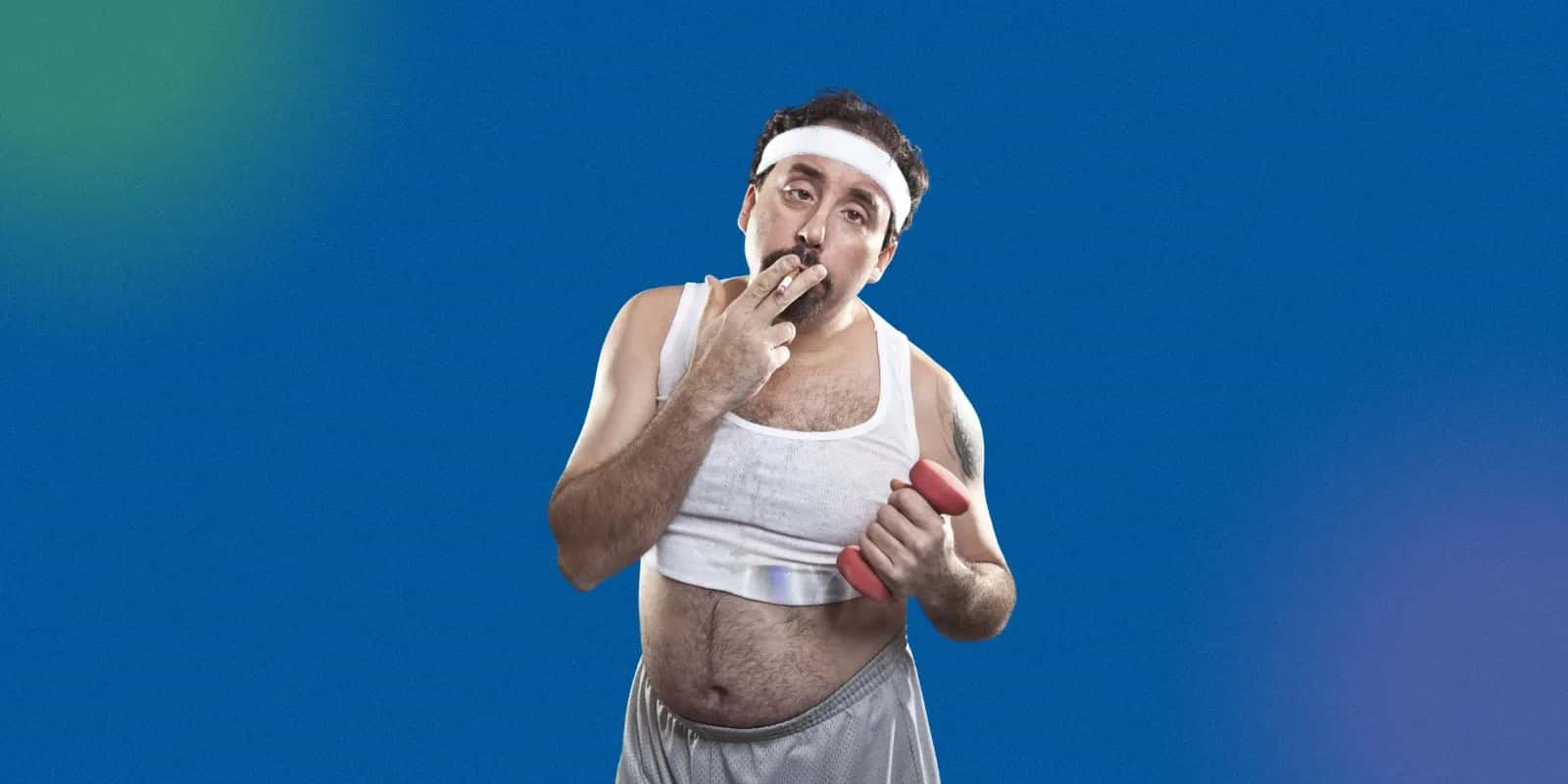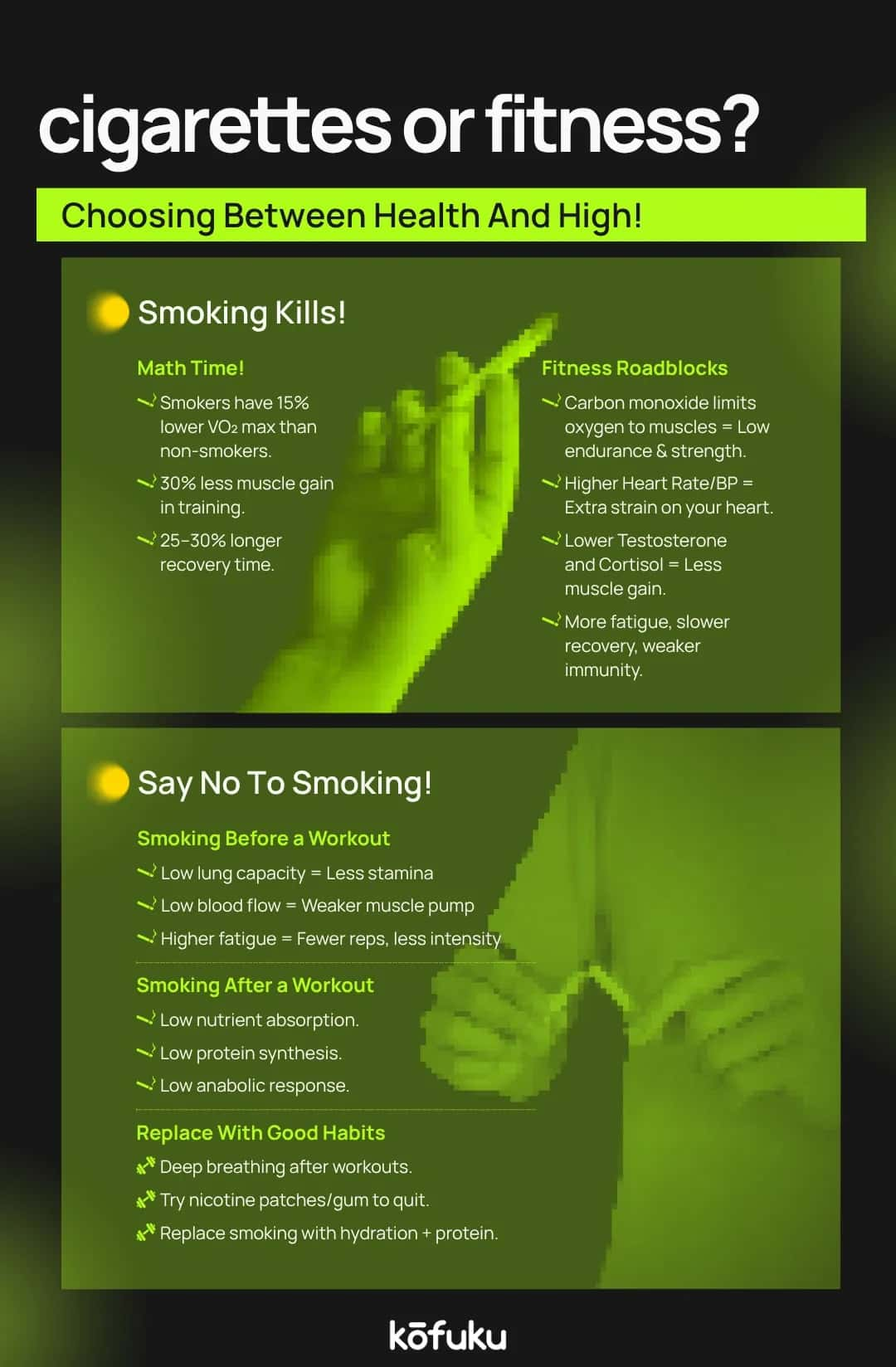Why Smoking a Cigarette Before or After Your Workout Can Harm Your Gains


Introduction
Taking a puff before or after your workout sounds tempting if you’re a smoker, but you may want to think twice before taking that call. The question is, does smoking affect muscle growth?
Well, the answer is that smoking and fitness don’t go hand in hand, particularly when it comes to gaining muscle, improving endurance, or even your run-of-the-mill workout routine.
This article will explain how smoking ruins your gains and how quitting can improve your performance.
Does Smoking Affect Muscle Growth and Recovery?
Smoking is injurious to health; there’s no doubt about that. Here’s how it affects your efforts for muscle growth and recovery:
1. Reduces Oxygen Delivery to Muscles
When you smoke a cigarette or a cigar before or after a workout, carbon monoxide binds to haemoglobin, which directly interferes with the oxygen-carrying capacity of your body. Since the level of oxygen delivered to your muscles is lower, they will underperform, take longer to repair, and reach their optimal capacity. Therefore, smoking stunts muscle growth.
2. Protein Synthesis is Blocked
Nicotine and the other chemicals in tobacco interfere with several pathways involved in muscle growth. After exercise, your body needs to use proteins to repair micro-tears in your muscles. This repair method is significantly impacted when you smoke.
3. Reduced Growth Hormone & Testosterone Levels
Smoking has been linked to lowering testosterone levels and disrupting your hormonal balance, both of which are pretty important when it comes to muscle growth and recovery. Therefore, if you smoke and are into strength and weight training, you will likely lose your gains and have a very slow progress rate.
4. Increased Cortisol
Smoking increases cortisol levels, which in turn increase muscle breakdown (catabolism) and may lead to muscle loss over time.

How Smoking Makes Things Worse
Before Exercise: Nicotine increases heart rate and blood pressure, lowering your threshold for exertion and oxygen consumption.
After Exercise: Smoking immediately after exercising reduces your muscle recovery window and slows the delivery of nutrients to your muscles.
In both cases, it’s a lose-lose situation as your strength is decreased and your progress stalls, along with a duller post-workout mood.
Can Smoking Reduce Your Workout Performance?
Definitely, smoking is like a grim reaper that is waiting to take away your progress and gains, and it happens fast:
-
Less endurance: Smokers tend to be more tired during cardio exercises, which is evident in trouble breathing, slower oxygen uptake, and increased fatigue.
-
Low strength: Smokers have lower grip strength, slower reaction speeds, and unstable cores.
-
Increased muscle soreness: Smokers take longer to recover from muscle injuries, leading to more inflammation, which makes each workout harder than it should be.
Does Nicotine Interfere with Recovery After Training?
Yes, there are several recovery drawbacks from nicotine use:
-
Disturbed sleep: Nicotine compromises REM sleep, including deep sleep and muscle repair.
-
Water loss: Nicotine is mildly diuretic, causing increased fluid loss.
-
Increased inflammatory response: Smokers experience more inflammation compared to non-smokers, which delays recovery and results in a greater chance of injury.

Quitting Smoking: A Game Changer for Fitness Enthusiasts
If your goal is to be fit, quitting smoking will benefit you in many ways. Here are some of them:
- Oxygen capacity can be restored within weeks, and your lung capacity will recover significantly and rapidly.
- Your anabolic balance will be improved, and your hormones, such as testosterone and growth hormone, will return to normal.
- You’ll recover faster from strength training, fatigue, and muscle soreness.
- You will also build endurance and strength, regaining your ability to push to your limits.
- Improved mood, confidence, and mental clarity will enable you to engage in more enjoyable and higher-quality workouts.
Tips to Reach Your Fitness Goals While Quitting Smoking
-
Get help: You can curb your cravings with the help of medications, counselling apps, patches, or varenicline.
-
Stay active: Move your body as a distraction! Take a walk, stretch, or mobilise to crush cravings.
-
Hit your protein requirements: Protein supports muscle and blood sugar stability.
-
Sleep better: You need good sleep to help with repair and focus your mind.
-
Track progress: Note what you have been doing for workouts and their results. This will motivate you to push yourself further and help you quit to achieve a healthier lifestyle.
Bottom Line
Smoking before or after your workout can negatively impact muscle growth, recovery, and performance. You are not just repairing your lungs when you quit smoking, but also unlocking the healthiest version of yourself!
Whether you smoke before or after your workout, there are long-term consequences that affect your body. At a basic level, smoking limits the supply of oxygen to muscles, which in turn affects your endurance, recovery, and even the way the body builds and maintains muscle.
Since nicotine constricts blood vessels, your body has a harder time delivering oxygen and other nutrients to your muscles when they need it the most, especially during and after exercise.
If you’re serious about your health, quitting smoking is one of the best decisions that you can make. Quitting will not only lead to improved performance and lifestyle but also contribute to better breathing, increased stamina, and ultimately promote stronger and healthier muscles in your body.
The best part is that your body starts healing almost immediately once you stop smoking! Your lung function will improve significantly, circulation will increase, and your energy levels will also improve, all within just weeks.
So, the next time you think about lighting up that cigarette, remember that your efforts will go to vain. Honour your fitness, give your body the best, and stop doing yourself a disservice.

FAQs
Q. How does smoking affect muscle growth?
Smoking reduces oxygen and testosterone levels, thus impacting protein synthesis and muscle growth.
Q. Why is smoking harmful before or after exercise?
A. Smoking increases your heart rate, decreases your oxygen flow, and delays recovery, making your training less effective.
Q. Can smoking reduce workout performance?
A. Yes, notice how easily you become out of breath while working out after smoking? That’s the effect of smoking on your lungs. This leads to decreased endurance and more fatigue, which will impact both your strength and conditioning.
Q. Does nicotine impact recovery after training?
A. Nicotine affects your sleep and increases inflammation in the body, making it difficult to recover and resulting in soreness that lasts longer.
Q. How can quitting smoking benefit your fitness goals?
A. Quitting will improve your endurance, hormone balance, recovery, and energy, enabling you to train harder and achieve results more quickly.

10 Tips to Clean Your Lungs After Quitting Smoking

7 Deadly Diseases Linked to Cigarette Smoking

Are Inhalers Addictive? What Are the Long-Term Effects?

7 Essential Facts You Should Know About Lung Cancer

Lung Opacity: What You Should Know

